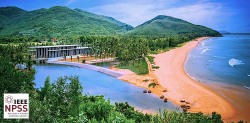Speaker
Description
The Real Time Processing Systems Division at Fermilab has deployed new features to the Off-The-Shelf Data Acquisition framework (otsdaq) for the Mu2e experiment. The Mu2e experiment will search for the coherent neutrino-less conversion of a muon into an electron in the field of an aluminum nucleus with a sensitivity improvement of 10,000 times over existing limits. Such a charged lepton flavor-violating reaction probes new physics at a scale unavailable at present or planned high-energy colliders. The Mu2e Trigger and Data Acquisition (TDAQ) system uses otsdaq as its online Data Acquisition System (DAQ) framework. otsdaq integrates the artdaq and art frameworks for event transfer, filtering, and processing. otsdaq is a web-based DAQ software suite focusing on flexibility and scalability and provides a multi-user interface accessible through a web browser. artdaq handles the entire data stream, which is read over the peripheral component interconnect express (PCIe) bus to a software filter algorithm that selects events combined with the data flux coming from a cosmic-ray veto (CRV) system. Detector front-ends are configured through the PCIe bus by customized otsdaq plugins. The otsdaq slow controls infrastructure has been further developed using the experimental physics and industrial control system (EPICS) open-source platform for monitoring, controlling, alarming, and archiving. The detector control system (DCS) for Mu2e has been integrated into otsdaq. The production TDAQ and DCS system has been deployed at the experimental hall and is being debugged and optimized for experiment operations. We report on the feature enhancements and deployment of otsdaq for Mu2e.
| Minioral | Yes |
|---|---|
| IEEE Member | No |
| Are you a student? | No |

